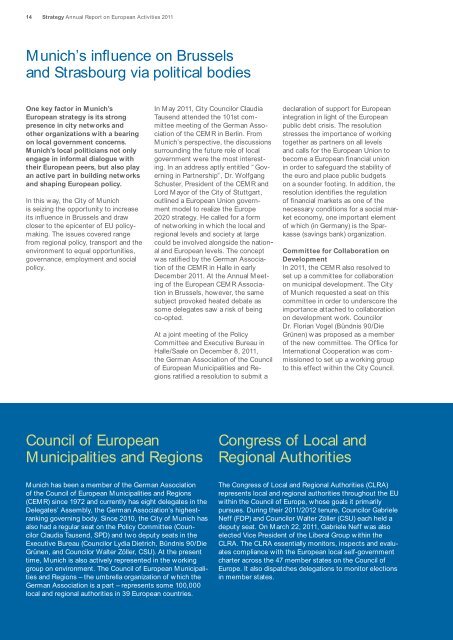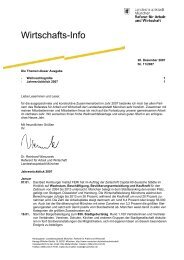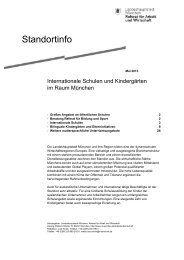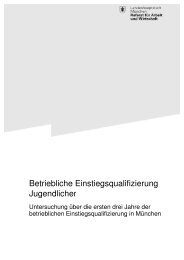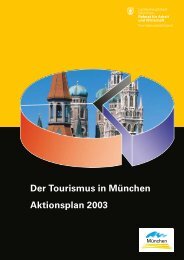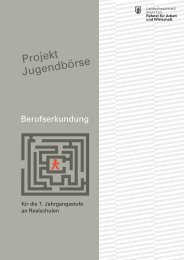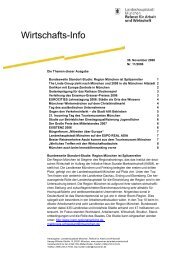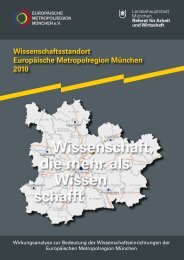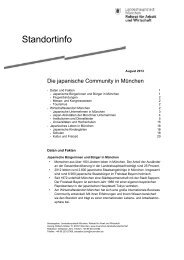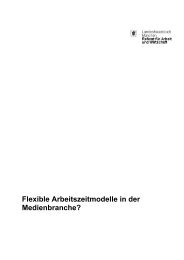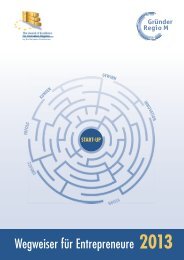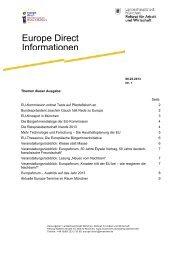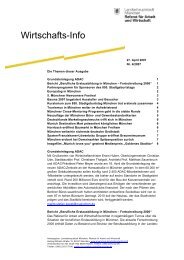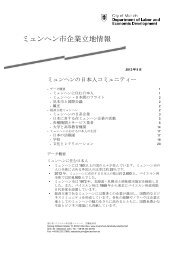Europa-Tag - Referat für Arbeit und Wirtschaft
Europa-Tag - Referat für Arbeit und Wirtschaft
Europa-Tag - Referat für Arbeit und Wirtschaft
Create successful ePaper yourself
Turn your PDF publications into a flip-book with our unique Google optimized e-Paper software.
14 Strategy Annual Report on European Activities 2011 Strategy Annual Strategie Report on <strong>Europa</strong>-Jahresbericht European Activities 2011 2011 15<br />
Munich’s infl uence on Brussels<br />
and Strasbourg via political bodies<br />
One key factor in Munich’s<br />
European strategy is its strong<br />
pres ence in city networks and<br />
other organi zations with a bearing<br />
on local government concerns.<br />
Munich’s local politicians not only<br />
engage in informal dialogue with<br />
their European peers, but also play<br />
an active part in building networks<br />
and shaping European policy.<br />
In this way, the City of Munich<br />
is seizing the opportunity to increase<br />
its infl uence in Brussels and draw<br />
closer to the epicenter of EU policymaking.<br />
The issues covered range<br />
from regional policy, transport and the<br />
environment to equal opportunities,<br />
governance, employment and social<br />
policy.<br />
Council of European<br />
Municipalities and Regions<br />
Munich has been a member of the German Association<br />
of the Council of European Municipalities and Regions<br />
(CEMR) since 1972 and currently has eight delegates in the<br />
Delegates’ Assembly, the German Association’s highestranking<br />
governing body. Since 2010, the City of Munich has<br />
also had a regular seat on the Policy Committee (Councilor<br />
Claudia Tausend, SPD) and two deputy seats in the<br />
Exe cutive Bureau (Councilor Lydia Dietrich, Bündnis 90/Die<br />
Grünen, and Councilor Walter Zöller, CSU). At the present<br />
time, Munich is also actively represented in the working<br />
group on environment. The Council of European Municipalities<br />
and Regions – the umbrella organization of which the<br />
German Association is a part – represents some 100,000<br />
local and regional authorities in 39 European countries.<br />
In May 2011, City Councilor Claudia<br />
Tausend attended the 101st committee<br />
meeting of the German Association<br />
of the CEMR in Berlin. From<br />
Munich’s perspective, the discussions<br />
surro<strong>und</strong>ing the future role of local<br />
government were the most interesting.<br />
In an address aptly entitled “Governing<br />
in Partnership”, Dr. Wolfgang<br />
Schuster, President of the CEMR and<br />
Lord Mayor of the City of Stuttgart,<br />
outlined a European Union government<br />
model to realize the Europe<br />
2020 strategy. He called for a form<br />
of networking in which the local and<br />
regional levels and society at large<br />
could be involved alongside the national<br />
and European levels. The concept<br />
was ratifi ed by the German Association<br />
of the CEMR in Halle in early<br />
December 2011. At the Annual Meeting<br />
of the European CEMR Association<br />
in Brussels, however, the same<br />
subject provoked heated debate as<br />
some delegates saw a risk of being<br />
co-opted.<br />
At a joint meeting of the Policy<br />
Committee and Executive Bureau in<br />
Halle/Saale on December 8, 2011,<br />
the German Association of the Council<br />
of European Municipalities and Regions<br />
ratifi ed a resolution to submit a<br />
declaration of support for European<br />
integration in light of the European<br />
public debt crisis. The resolution<br />
stresses the importance of working<br />
together as partners on all levels<br />
and calls for the European Union to<br />
become a European fi nancial union<br />
in order to safeguard the stability of<br />
the euro and place public budgets<br />
on a so<strong>und</strong>er footing. In addition, the<br />
resolution identifi es the regulation<br />
of fi nancial markets as one of the<br />
necessary conditions for a social market<br />
economy, one important element<br />
of which (in Germany) is the Sparkasse<br />
(savings bank) organization.<br />
Committee for Collaboration on<br />
Development<br />
In 2011, the CEMR also resolved to<br />
set up a committee for collaboration<br />
on municipal development. The City<br />
of Munich requested a seat on this<br />
committee in order to <strong>und</strong>erscore the<br />
importance attached to collaboration<br />
on development work. Councilor<br />
Dr. Florian Vogel (Bündnis 90/Die<br />
Grünen) was proposed as a member<br />
of the new committee. The Offi ce for<br />
International Cooperation was commissioned<br />
to set up a working group<br />
to this effect within the City Council.<br />
Congress of Local and<br />
Regional Authorities<br />
The Congress of Local and Regional Authorities (CLRA)<br />
represents local and regional authorities throughout the EU<br />
within the Council of Europe, whose goals it primarily<br />
pursues. During their 2011/2012 tenure, Councilor Gabriele<br />
Neff (FDP) and Councilor Walter Zöller (CSU) each held a<br />
deputy seat. On March 22, 2011, Gabriele Neff was also<br />
elected Vice President of the Liberal Group within the<br />
CLRA. The CLRA essentially monitors, inspects and evaluates<br />
compliance with the European local self-government<br />
charter across the 47 member states on the Council of<br />
Europe. It also dispatches delegations to monitor elections<br />
in member states.<br />
Benefi ting from partnerships:<br />
The Eurocities network<br />
For cities, lifelong learning is<br />
in creasingly becoming a vital factor<br />
of success. The value of qualifi -<br />
cations erodes much more quickly<br />
these days, making con tinuous<br />
development and learning a necessity.<br />
That is perhaps why more than<br />
70 re presentatives of local governments<br />
from over 15 European<br />
countries attended the Eurocities’<br />
Economic Development Forum on<br />
Lifelong Learning in Munich on April<br />
6 – 8, 2011.<br />
The winning entry in the Eurocities photo competition, from<br />
Mahir Cetin: a barbecue scene in the Flaucher riverside leisure area<br />
These experts from cities throughout<br />
Europe came together to discuss<br />
strategies to promote lifelong learning<br />
and present their own cities’<br />
strat egies and projects to launch this<br />
process and maintain momentum.<br />
Munich showed its guests a broad<br />
spectrum of tools, projects and<br />
campaigns on the subject of lifelong<br />
learning. One example involved the<br />
“Junge <strong>Arbeit</strong>” (“Young Work”)<br />
training workshop in the Hasenbergl<br />
district. The workshop is open<br />
to young people who fi nd it diffi cult<br />
to become integrated in the labor<br />
market due to family, social or health<br />
problems.<br />
In November 2011, 250 local government<br />
offi cials and representatives of<br />
municipal administrations – including<br />
a delegation from Munich – then<br />
convened in Genoa for Eurocities’<br />
Annual Conference. Urban development<br />
planning was the central theme<br />
of the event, which focused on issues<br />
such as the early involvement of residents<br />
in local government planning<br />
processes. Arguing for a vibrant city-<br />
scape, keynote speaker Renzo Piano,<br />
Genoa’s star architect, demanded<br />
improvements and guarantees for<br />
the quality of life in and amenity value<br />
of public spaces. To mark its 25th<br />
anniversary, Eurocities had run a photo<br />
competition, inviting young people between<br />
the age of 15 and 25 to submit<br />
a picture of their city. The picture of<br />
Munich was sought out in collaboration<br />
with jetzt.de, the youth portal operated<br />
by the infl uential daily Süddeutsche<br />
Zeitung. The winning entry<br />
was a barbecue scene from the<br />
Flaucher riverside leisure area.<br />
Right now, the Eurocities network is<br />
focusing its attention on efforts to<br />
review and add concrete detail to<br />
European competition policy. The aim<br />
is to ensure that local authorities can<br />
continue to provide services of general<br />
interest. At the same time, they<br />
have been working hard preparing position<br />
papers on Europe’s f<strong>und</strong>ing policy<br />
for the period from 2014 through<br />
2020. At the invitation of the City of<br />
Munich, the Eurocities Cultural Forum<br />
and a number of workgroups will meet<br />
in Munich in the course of 2012.


